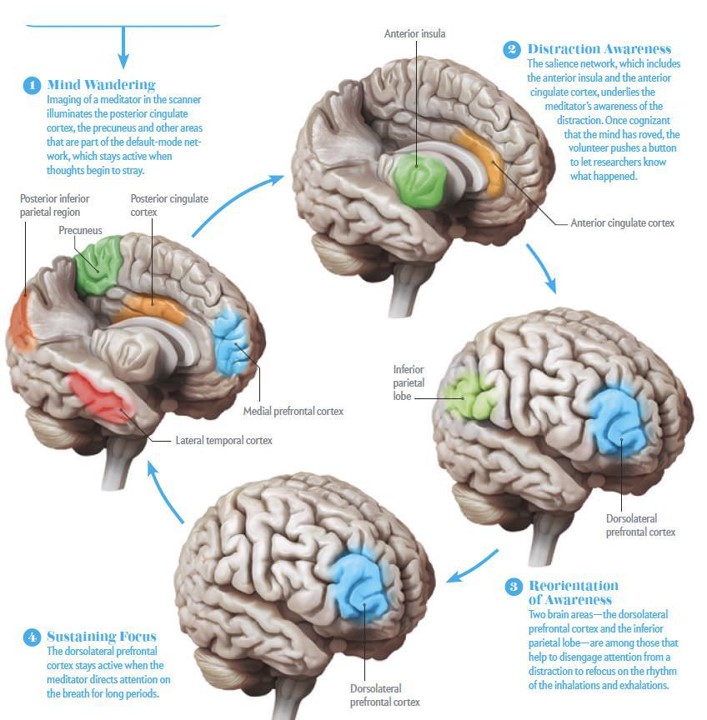Mindfulness training and practice has been growing within the legal profession for years with some law firms, such as Dentons, hiring a Chief Mindfulness Officer. In many ways, it is no surprise that a profession which so fully relies on focused minds should take an interest in this mind training. This short article sets out three specific ways mindfulness training can help the work and personal lives of lawyers.
1. Practical Stress Reduction
The legal profession is one of the most stressful, with high levels of anxiety. This is compounded because the profession is also highly competitive, therefore many lawyers do not feel they can seek support to help them manage their stress levels. Ideally, with greater national awareness of mental health, this ethos will gradually change.
So, how can Mindfulness training help lawyers cope? Paradoxically, Mindfulness reduces internal stress levels by becoming aware of the stress which is causing so much anxiety. Initially, people may feel that Mindfulness is increasing stress; however, this is because they are beginning to notice how much stress they are putting their minds and bodies under.
After this initial perceived increase, the mind and body can learn to let go of unnecessary tension. When we bring awareness to tension in the body, our bodies very naturally let go.
Try, right now, bringing attention to your:
- Shoulders
- Neck
- Face
- Whole body
There is a very good chance, as you’re reading this article, your body has been holding on to unnecessary stress, especially as that is the subject matter. When we bring awareness to this subconscious stress, we learn to let it go. This avoids acute stress becoming chronic or long-term which tends to cause the more serious mental and physical ill-health conditions.
And once you’ve learnt mindfulness, it really is so practical. You can become aware of stress build up at any time of day, in any place – office, home, court room and practise while you’re making a call (or Zoom call), or working on your laptop, or walking from the car to the office – the opportunities are endless.
2. Increasing Focus
How Mindfulness can reduce stress has been well researched since the 1980’s when Jon Kabat-Zinn designed his Mindfulness Based Stress Reduction course. However, the ability for Mindfulness to increase focus is less well known.
Mindfulness, is a mind training which increases focus by noticing mind wandering and then re-engaging the mind with ‘one-pointed awareness.’ It is possible to 100% fully engage the mind in what we are presently doing. This is what Hungarian-American Psychologist Mihaly Csikszentmihalyi called being in a state of flow. Musicians, artists, mathematicians recognize this state of high concentration. Maybe you’ve experienced it when fully absorbed in a case to such a degree that time and the space around you seem to fade away.
However, for the majority of our lives, focus switches from one thing to the next often without conscious choice. This is becoming increasingly prevalent in a society when information continually draws our attention from a variety of sources – the internet, email, phone, social media… occasionally even real people! Therefore, a mind training has never been more relevant.
The brain diagram above, taken from Scientific American, shows the brain in meditation. It shows the process of focusing the mind on one object, usually the breath (the brain at the bottom of the diagram). Then – moving clockwise – the period of mind wandering when that focus is lost, followed by the awareness of mind wandering and finally refocusing the attention back on the breath.
The diagram is especially useful for people who are beginning the practice because it demonstrates how mindfulness is not just about keeping the focus continuously on one object, or clearing the mind, but rather noticing this mind wandering and then re-gathering attention. It’s analogous to the exercise repetitions one might do in the gym.
Therefore, Mindfulness training can help solicitors who continuously need to maintain focus, often on complex information, to notice mind wandering and bring the attention back again. It will also help them to recognize when they have been working beyond their productive limit and so need to take a break and return to work after a short rest.
3. Switching between Work and Home life
Work-life balance is set to become even more challenging as more of us work virtually and our work and personal lives increasingly overlap. Many professionals struggle to find work-life balance and in this regard solicitors are no exception. The way Mindfulness can help very much links to the last two points – stress reduction and focus.
Often when highly stressed we can, unfortunately, take it out on the people closest to us. How many times have you noticed that your partner might be very calm and understanding with a friend or acquaintance and then snappy and irritable with you? And, of course, this works the other way around. We will often snap and argue with those we love the most, not because we’re angry with them but because we are stressed about something else and that stress ‘comes out sideways’. Therefore, if you can learn to manage your stress levels more effectively, that should mean time spent with friends and family is less stressful and more calm and fulfilling.
Likewise, increasing focus is good for noticing when you’re physically in the same space as your friends or family but mentally still sat with that client or manager or in the office or court room. Mindfulness training brings body and mind together, so you can be mentally and emotionally with friends and family, rather than just physically there but mentally elsewhere.
Adrian delivers mindfulness training through coaching, workplace courses and his Lawyers’ Healthy Minds Group.
For more details, contact Adrian at adrian@nimisa.co.uk or 07806 570 122.
https://www.eventbrite.co.uk/e/lawyers-healthy-minds-group-tickets-107236226440



